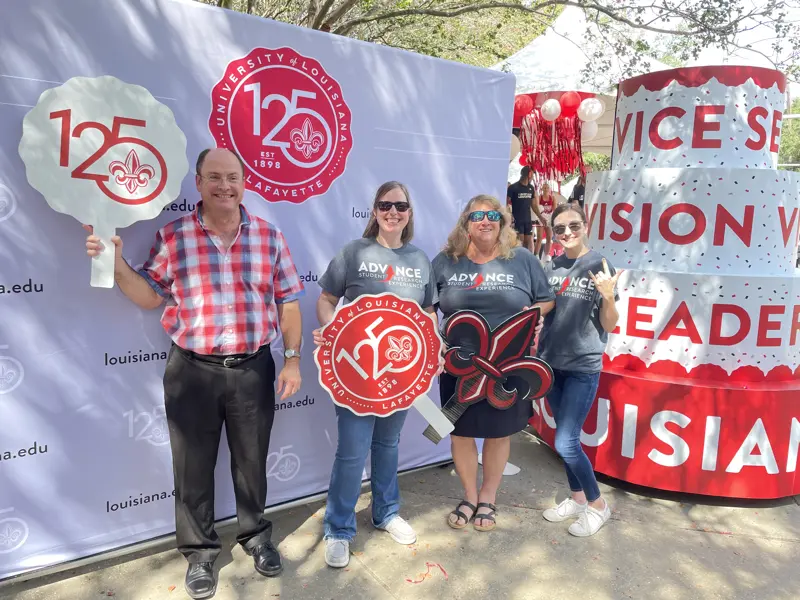Sherry Krayesky-Self Interview
(Krayesky-Self, second from right, with her team from the Student Center for Research, Creativity, and Scholarship at the University of Louisiana at Lafayette)

"It turns out that university life and high school life are very different. I did not know this and most of the people I knew at the time also did not know this."
Tell us about your background and about your life growing up.
My father was in the Navy during my childhood, so I grew up all over the world. However, my extended family (grandparents, aunts, uncles, and cousins) are all form the Quad Cities area.
What community college did you attend and why?
My Associate of Arts degree came from Carl Sandburg College in Galesburg, Illinois. I took a lot of classes at Southeastern Community College (SCC) in Burlington, Iowa, that had an agreement with Carl Sandburg to transfer courses.
Who were some individuals that helped shape your success during this time, and how did they do it?
I have a bachelor's degree from Southern Illinois University in physiology. The anatomy instructor at Southeastern Community College, the sadly now-deceased Dan Ring, helped me understand that research was something that I enjoyed. I did not understand how I could fit into intellectual exploration. I looked at learning as a path to employment, but I learned that a college education was also a path to personal growth.
How has attending a community college influenced your outlook on education and life?
When I graduated from high school, I was not ready to attend college. Many people in my high school class also chose not to attend, so it was easy for me to reject more time in school. But it soon became clear that I needed more education to get the jobs I wanted.
It turns out that university life and high school life are very different. I did not know this and most of the people I knew at the time also did not know this. I am a first-generation college student. In fact, at one time my mother and I were both taking college courses at different places. Community college showed me the reality of higher education. It allowed me to explore and dream about my possibilities in a fashion that was different from anything I had experienced.
How do you view community colleges as being institutions that provide equitable opportunities for students who are pursuing a postsecondary education?
When I applied to the community college, I would not have qualified to attend a research university. Because my family moved around a lot, I went to several high schools and my training was not complete. Community colleges can and do help people who need more preparation for university to get prepared. They also offer opportunity to students who started university and then stopped. Anyone who needs a little more attention or assistance to work themselves “up to speed” before attending a research university can find that help at a community college. I am glad I went that route because I am not sure my success would have been as good without my community college experience.
How did your learning and overall experiences at a community college lead to your further course of study and current career?
I would not have chosen physiology as a major, nor would I have chosen research as part of my path without the community college experience. I did not realize that this was something a person could be employed to do.
You recently attended the S-STEM convening at Virginia Tech. What was the experience like and what did you get out of it?
I enjoyed hearing how my colleagues across the country were solving similar problems to those I face. I was glad to learn how effective collaborations between institutions at varying levels were and could be. I was very excited to learn that program I took part in as a student still existed and had become very successful at helping people find their educational paths.
Tell us something fun about yourself.
I am a flamingo addict. They are huge pink birds that should not be so successful in nature. How on Earth can a predator miss something that big and that pink? Yet, they are very successful as a species because they endure very tough conditions with ease. “Be a flamingo in a flock of pigeons.”